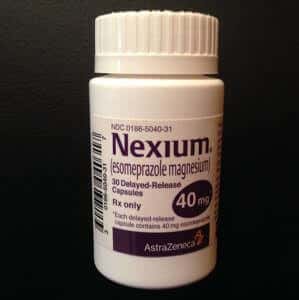
When your doctor hands you a prescription, do you ask about the exit strategy? Most people don’t, but perhaps you should. Some drugs are very difficult to quit once you have been taking them for a while. And we’re not just talking about narcotics. People stopping heartburn drugs may need a lot of patience and many different strategies.
Stopping Heartburn Drugs Can Lead to Rebound Reflux:
It may come as a surprise that some popular heartburn medications fall into this category. Health care providers often prescribe medicines such as dexlansoprazole (Dexilant) and rabeprazole (Aciphex) to treat a range of digestive troubles. Individuals suffering from heartburn or indigestion often take over-the-counter products such as esomeprazole (Nexium), lansoprazole (Prevacid) or omeprazole (Prilosec) for relief. But getting off one of these proton-pump inhibitor (PPI) meds can sometimes be a challenge.
Here is what one reader found:
“Had I known what I know now about Prevacid, I’d never have started it. I am off it now and have been for a few years, but I had no idea how hard it would be to wean off of it.”
Danish researchers uncovered this difficulty when they put healthy volunteers with no heartburn symptoms on either Nexium or placebo for eight weeks (Gastroenterology, July, 2009). At that point, both groups were given placebo, although they did not know it. Those who had been taking Nexium suffered from serious heartburn for several weeks.
The investigators concluded,
“PPI therapy for 8 weeks induces acid-related symptoms in healthy volunteers after withdrawal.”
A People’s Pharmacy reader had a very similar experience:
“I have been trying to get off Prilosec for a couple of years. Every time I do, after a few days I am so miserable that I weaken and start it again. Whether it is really GERD or rebound, of course, is impossible to know. My local pharmacist never heard of a rebound effect from PPIs. He had no helpful advice about how to stop it. Every time I discuss it with my doc, he just says it won’t hurt me to keep taking it. I’m not sure he believes there is really a rebound.”
Problems with Continuing Heartburn Drugs:
Many doctors think that these drugs are so safe they can be taken indefinitely without consequences. But evidence of harm has been growing. Scientists have found that people taking PPIs are more likely to come down with intestinal infections such as C. difficile or lung infections leading to pneumonia.
Without stomach acid, some nutrients are not well absorbed. A lack of calcium, iron, magnesium or vitamin B12 could have negative consequences for health. The most recent finding is that long-term PPI use may reduce blood vessel flexibility because they reduce the body’s production of nitric oxide (Circulation,Aug. 20, 2013). As a result, experts are advising doctors to deprescribe these medications (Australian Journal of General Practice, Nov. 2022).
Help Stopping Heartburn Drugs:
Q. My doctor prescribed esomeprazole for heartburn about six years ago. It worked, so I kept on taking it.
I began to experience worrisome symptoms several months ago, though. It felt like I had massive brain fog. I would forget things that I used to take for granted.
Then I read that drugs like this might impact the brain. Stopping was awful because I had rebound acid symptoms. DGL has been somewhat helpful. Do you have any other suggestions?
A. Proton pump inhibitors (PPI) like esomeprazole, lansoprazole and omeprazole often trigger rebound hyperacidity when people stop such drugs suddenly. DGL stands for deglycyrrhizinated licorice. It is safer than regular licorice, which can raise blood pressure and deplete potassium.
Gradual drug tapering can help. Adding an H2 blocker as you wean off the PPI may provide a safety net. Drugs like cimetidine (Tagamet) and famotidine (Pepcid) can be helpful. The US Department of Veterans Affairs offers advice for physicians to help people stopping heartburn drugs.
Readers Recommend Varied Approaches:
People’s Pharmacy readers have offered helpful suggestions on gradually reducing the dose of such drugs by emptying the capsules a bit at a time. In addition, some drank water with a tablespoon of apple cider vinegar or raw cabbage juice. Others sipped herbal teas containing ginger, cinnamon and persimmon. Chewing sugarless gum may help ease symptoms because saliva is a natural buffer.
For more details on getting off PPIs, a recipe for persimmon-ginger tea and other options for treating heartburn, we offer our Guide to Digestive Disorders. You may find a number of helpful recommendations in this online resource.
Citations
- Reimer C et al, "Proton-pump inhibitor therapy induces acid-related symptoms in healthy volunteers after withdrawal of therapy." Gastroenterology, July, 2009. DOI: 10.1053/j.gastro.2009.03.058
- Ghebremariam YT et al, "Unexpected effect of proton pump inhibitors: elevation of the cardiovascular risk factor asymmetric dimethylarginine." Circulation,Aug. 20, 2013. DOI: 10.1161/CIRCULATIONAHA.113.003602
- Turner JP et al, "Deprescribing proton pump inhibitors." Australian Journal of General Practice, Nov. 2022. PMID: 36310001

